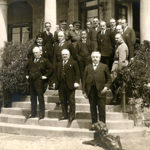Published March 29, 2007
Intercollegiate Studies and Cato Institutes Conference
Remarks prepared for delivery at an Intercollegiate Studies and Cato Institutes Conference at the Cato Institute, Washington, D.C., 29 March 2007
**A pdf version of this speech with complete footnotes and appendix is available here.**
The Intercollegiate Studies and Cato Institutes deserve our thanks for this conference posing the question, “What Should Be a Culture of Enterprise in an Age of Globalization?” But I think we must start with a prior question: Isn’t “culture of enterprise” really an oxymoron?
“Culture,” as philosopher Joseph Pieper observed, “depends for its very existence on leisure, and leisure, in its turn, is not possible unless it has a durable and consequently living link with the cultus, with divine worship.” This link “is the primary source of man’s freedom” and explains why culture comprises “those gifts and qualities which, while belonging to man, lie beyond the immediate sphere of his needs and wants.” Enterprise on the other hand seems to belong precisely to “the immediate sphere of [human] needs and wants.” A “culture of enterprise” would therefore seem to be one which idolizes business.
The apparent contradiction can be resolved once we recognize that broadly speaking, enterprise is nothing but the cardinal virtue of prudence. The French entreprise means “to undertake,” and down to the time of Adam Smith the English word for entrepreneur was “undertaker.” Despite its modern connotation of spineless pusillanimity, prudence is the ability to grasp any situation in all its complexity and respond by undertaking the right action. Personal prudence is essential in guiding our personal behavior; domestic prudence our family (or its modern offshoots, the business firm and charitable foundation); and political prudence the conduct of government. To these correspond personal, domestic and political economy, respectively. From this it is clear that, while enterprise in the narrow sense is business economy, it is included in the broad sense, but not vice versa. I suggest we must therefore define a culture of enterprise in the broad sense, as one that empowers its members (1) to express ordinate love of God, neighbor and self (2) in their personal, domestic (personal, business, charitable), and political capacities (3) while engaging global competition and needs.
To unpack what this means, we must recognize another important fact: The logical and mathematical structures of scholastic, classical and today’s neoclassical economics differ fundamentally. Most economists are unaware of this because, starting in 1972 at the University of Chicago, George J. Stigler succeeded in his national campaign, begun in 1954, to abolish the longstanding requirement that students of economics master its history before being granted a degree. We therefore need some kind of Rosetta stone for mutual translation among economists in this Tower of Babel: a brief, remedial history of economics.
What is economics about? It describes from one angle what people do all day. Jesus (of all people) once noted that since the days of Noah and Lot and until the end of the world, humans have been doing and will be doing four kinds of things. He gave these examples: “planting and building,” “buying and selling,” “marrying and being given in marriage,” and “eating and drinking” : in other words, we produce, exchange, distribute and use (or consume) our human and nonhuman goods. That’s the usual order in action. But in planning, first we choose For Whom we intend to provide, which we will express by the distribution of our goods; next What goods to provide as means for those persons; and finally How to provide these means, through production and (usually) exchange. So we might say that economics is essentially a theory of providence: it describes how we provide for ourselves and the other persons we love, using scarce means that have alternate uses.
Scholastic economics began in the mid-13th century when Thomas Aquinas first integrated these four elements, all drawn from Aristotle and Augustine, to describe personal, domestic and political economy. The scholastic economic system is comprehensive, logically complete, mathematical, and empirically verifiable. Joseph Schumpeter incorrectly wrote that Augustine “[n]ever went into economic problems” and that Aquinas’ economics was “strictly Aristotelian.” Aquinas not only combined Aristotle’s contributions with but also subordinated them to Augustine’s in both “positive” (descriptive) and “normative” (prescriptive) theory.
“Positive” scholastic theory.
Aquinas had paraphrased Aristotle’s “final cause” by observing that “every agent acts for an end.” But this is true in quite different senses of not only humans but also an arrow aimed at a target and the family cat aiming for a meal, To distinguish these, Augustine had started from Aristotle’s definition of love — willing some good to some person — and drew an implication that Aristotle had not: every person always acts for the sake of some person(s). For example, when I say, “I love vanilla ice cream,” I really mean that I love myself and use — consume — vanilla ice cream (rather than, say, strawberry ice cream or Brussels sprouts) to express that love. In other words, we act on two scales of preference, not one — for persons as ends and other things as means — guided by personal love and utility, respectively.
Since man is a social creature, “human society is knit together by transactions of giving and receiving,” Augustine noted. But these outwardly similar transactions are of two essentially different kinds: “sale or gift.” Generally speaking, we give our wealth without compensation to the people we particularly love, and sell it to people we don’t. Since it’s always possible to avoid depriving others of their own goods, this is the bare minimum of love expressed as benevolence or goodwill and the measure of what Aristotle called justice in exchange. But our self-love is expressed by the utility of the goods we provide ourselves, and our love of others with beneficence: gifts. (Hate is expressed by the opposite of a gift: maleficence or crime.) The social analog to personal gifts is what Aristotle called distributive justice : the formula we use in social communities like a family or nation to distribute common (jointly owned) goods. Both are a kind of “transfer payment”; both are determined by geometric proportion; and both are practically limited by the fact of scarcity.
“Normative” scholastic theory.
We naturally love ourselves, Augustine pointed out. All other moral rules are derived from the Two Great Commandments because these measure the degree to which our love is “ordinate”: rightly ordered. If a good were sufficiently abundant we could and should share it equally with everyone else. But with such goods as time and money, which are “diminished by being shared” (i.e., scarce), this is impossible. Therefore “loving your neighbor as yourself” can’t always mean equally with yourself: “Since you cannot do good to all,” Augustine concluded, “you are to pay special regard to those who, by the accidents of time, place, or circumstances, are brought into closer connection with you.” Aquinas applied but extended Aristotle’s corresponding analysis to all communities: Common goods are necessary to the existence of both families and governments. But the fact of scarcity requires that most common goods be owned by families, not governments, because of the two advantages noted by Aristotle (greater social peace and productivity) and the third added by Aquinas (greater order). Distributive justice and/or justice in exchange are violated by what James Madison later described as faction. Each faction has an ideology, which Hannah Arendt succinctly defined as a world-view that requires its adherents to create a “fictitious world,” distorting reality to the advantage of its members. For example, collectivist ideology collapses justice to distributive justice, as if all goods were both common and political; while libertarian ideology collapses justice to justice in exchange, as if all goods were both private and never given.
Scholastic economics (c.1250-1776) was taught at the highest university level for more than five centuries by Catholics and (after the Reformation) Protestants alike. For example, Alexander Hamilton, who penned two-thirds of the Federalist, adopted it from such Protestant scholastics as Lutheran Samuel Pufendorf, who was widely read in the colonies.
Classical economics (1776-1871) began when Adam Smith tried to chop the four scholastic elements to two: dropping Augustine’s theory of utility (which describes consumption) and replacing Augustine’s theory of personal distribution and Aristotle’s theory of social distribution with the mere assumption that everyone is motivated by self-love. This is how classical economics began with only two elements, production and exchange.
Today’s neoclassical economics (1871-c.2000) began when three economists dissatisfied with the failure of classical predictions independently but almost simultaneously reinvented the theory of utility, starting its reintegration with the theories of production and exchange. In his prize-winning book, Tom Woods describes the scholastics as “proto-Austrians.” Joseph Schumpeter considered them “proto-Walrasians.” I used to share such “Whig histories of economics,” but had to abandon them about 10 years ago because they fail to wrap up all the “leftovers.” As Alex Chafuen has noted, personal gifts and distributive justice were both central to scholastic economic theory, early and late. Yet they are not taught (except by claiming them to be disguised exchanges) in any neoclassical school, including the Austrians.
In a forthcoming book, I predict that in coming decades Neoscholastic or “AAA” economics (c.2000- ?) will revolutionize economics once again by replacing its lost cornerstone — the theory of personal and social distribution.
I think I can explain both why and how this is already beginning. First, why: Like neoclassical relative to classical theory, the neoscholastic approach can answer questions that no existing neoclassical theory can: for example, making superior empirical predictions about crime, fertility, and unemployment. I don’t have time for detailed explanations in these introductory remarks, but I’ve done so elsewhere and am prepared to do so today at the drop of a question.
Second, how is illustrated by two of the most interesting events in which I’ve participated in the past year: helping judge the first undergraduate essay contest for ISI’s Culture of Enterprise Initiative (which posed a question closely related to ours: “Can character and community survive in an age of globalization?”); and the Lehrman Summer Institute at Princeton, co-sponsored by ISI and Princeton’s James Madison Program. Both are fascinating because they give a bird’s-eye view of what students are (and are not) learning, and what professors are trying to teach, in various departments at a broad range of American (and some foreign) universities. What I found most striking in the student essays was the sharp divergence between the essayists majoring in economics and those majoring in other disciplines. The economics majors competently covered the three neoclassical elements I have mentioned — production, exchange and consumption — then stopped, never hinting that economic theory ever had or could describe anything else, like love. Yet a majority of humanities and interdisciplinary majors clearly stated all four basic elements and correctly integrated them at most (in one case all three) levels: personal, domestic and political economy. Apparently, a surprisingly complete outline of economic theory is still being taught in American universities — just not in the economics departments! But through the Lehrman Summer Institute I’m watching the teaching start to change: a rising young professor of economics and a rising young professor of philosophy or history at the same university, both dissatisfied, are conferring for the first time about revisions to their respective curricula, to bring them back into agreement with each other (and with reality).
To conclude, I find a surprising amount of hope, not just for a culture of enterprise, but also for a little enterprise in our academic culture.








